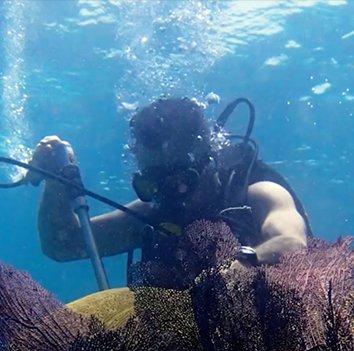Master of Science Graduate Program
The M.S. program includes coursework and a research-based thesis. The curriculum is flexible, and a program that is consistent with the student’s background, and professional and research objectives, is developed by the student and his or her faculty advisory committee. Like the Ph.D. program, the M.S. program assumes a basic undergraduate foundation in the geosciences. Students lacking such a background may be required to complete certain subjects at the undergraduate level before or during their graduate program. Master’s candidates in geology or geophysics are expected to have taken two semesters (or equivalent) of a college-level physics or chemistry course before admission, and must complete, or have completed, a minimum of two semesters of college-level calculus before completing their degree. Students are encouraged to obtain broad backgrounds by taking courses in geology, geophysics, and environmental geosciences along with the other sciences and mathematics. Multidisciplinary preparation is particularly useful for students seeking future employment in industry.
The program stresses a strong background in the earth sciences, as well as the ability to carry out research. It prepares students for successful careers as geoscientists in the environmental consulting and engineering industries, natural resource exploration, government service, or for continued studies toward a Ph.D. A particularly beneficial aspect of the M.S. program is the opportunity for students to integrate studies in geology, geophysics, and environmental subjects.
Deadline for fall admission is
January 2

Curriculum and Requirements
No fixed curriculum is prescribed for the M.S. degree. Instead, a course and research program that is consistent with the student's background and professional objectives are developed by the student and his or her faculty advisory committee. The graduate program assumes a basic undergraduate foundation in the geosciences. Students lacking such a background may be required to complete certain subjects at the undergraduate level before or during their graduate program.
A summary of the regulations for graduate students in the Department of Earth and Environmental Sciences as well as information for enrolled and prospective graduate students can be found in the Graduate Student Regulations and Procedures Handbook.
Master of Science in Teaching (M.S.T.)

The Master of Science in Teaching (M.S.T.) program is administered through the Lynch School of Education in cooperation with the Department of Earth and Environmental Sciences. It requires admission to both the Lynch School of Education and the Department of Earth and Environmental Sciences. The program, designed for prospective teachers, acknowledges variations in prior background and skills.
Degree Requirements
The five required courses in the earth sciences must be chosen from among the following: two courses from Exploring the Earth I and II or Structural Geology I, and one course from each of the following groups:
- Earth Materials or Petrology
- Weather, Climate, Environment, Oceanography, or Astronomy
- Petrology, Structural Geology I or II, Environmental Geology, Environmental Chemistry, or Introduction to Geophysics
Students who have previously taken these courses may substitute other graduate courses within the Earth and Environmental Sciences department with approval. One semester of full-time residency may be necessary. A comprehensive examination is given to each student near the end of the program. This examination is in two parts—one part is oral in the earth sciences, and the other part is given by the Lynch School of Education.No fixed curriculum is prescribed for the M.S. degree. Instead, a course and research program that is consistent with the student's background and professional objectives are developed by the student and his or her faculty advisory committee. The graduate program assumes a basic undergraduate foundation in the geosciences. Students lacking such a background may be required to complete certain subjects at the undergraduate level before or during their graduate program.
A summary of the regulations for graduate students in the Department of Earth and Environmental Sciences as well as information for enrolled and prospective graduate students can be found in the Graduate Student Regulations and Procedures Handbook.

